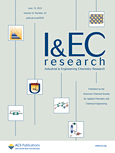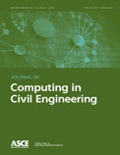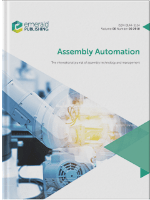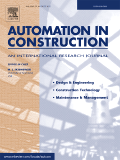
Digital Chemical Engineering
Scope & Guideline
Exploring New Frontiers in Chemical Engineering with Open Access Research
Introduction
Aims and Scopes
- Integration of Artificial Intelligence and Machine Learning:
The journal emphasizes the application of AI and machine learning techniques to optimize chemical processes, enhance predictive control, and facilitate decision-making in complex systems. - Digital Twins and Virtual Simulations:
Research frequently explores the development of digital twins and virtual simulation models to improve training, monitoring, and optimization of chemical engineering processes. - Data-Driven Approaches:
A significant focus is on data-driven methodologies, including machine learning and statistical techniques, for modeling, monitoring, and control of chemical processes. - Process Automation and Control:
The journal covers advancements in automation technologies and control strategies, particularly model predictive control and smart manufacturing solutions. - Sustainability and Environmental Impact:
There is a consistent emphasis on sustainable practices within chemical engineering, including studies on carbon capture, renewable materials, and energy-efficient processes. - Educational Innovations in Chemical Engineering:
The journal also addresses educational methodologies and tools, particularly the use of digital tools and AI in teaching chemical engineering concepts.
Trending and Emerging
- Machine Learning and Predictive Analytics:
There is a growing emphasis on machine learning applications for predictive modeling and optimization of chemical processes, showcasing the industry's shift towards data-centric methodologies. - Digital Twins and Smart Manufacturing:
The development of digital twins and their applications in smart manufacturing and process monitoring are emerging as crucial themes, reflecting the industry's move towards enhanced operational efficiency. - Sustainable Engineering Practices:
Research on sustainability, including carbon capture technologies and green chemistry approaches, is trending as industries seek to reduce their environmental footprint. - Interdisciplinary Applications of AI:
The integration of artificial intelligence across various domains, including energy systems and bioengineering, is increasingly popular, highlighting the versatility of AI in chemical engineering. - Educational Tools for Chemical Engineering:
The emergence of digital tools and AI in educational frameworks indicates a trend towards enhancing learning experiences and methodologies in chemical engineering education.
Declining or Waning
- Traditional Experimental Methods:
There is a noticeable decline in publications focusing solely on traditional experimental methods without the integration of digital technologies. This shift reflects the increasing importance of computational and data-driven approaches. - Basic Process Design Without Digital Integration:
Research centered on basic chemical process design that does not incorporate digital tools or data analytics is becoming less frequent, indicating a move towards more sophisticated and integrated approaches. - Conventional Control Strategies:
The focus on conventional control strategies, such as PID control without enhancements from digital or AI technologies, has diminished as more advanced methodologies gain prominence.
Similar Journals

INDUSTRIAL & ENGINEERING CHEMISTRY RESEARCH
Transforming Ideas into Engineering ExcellenceINDUSTRIAL & ENGINEERING CHEMISTRY RESEARCH, published by the American Chemical Society, is a pivotal journal that disseminates high-quality research in the fields of Chemical Engineering, Chemistry, and Industrial and Manufacturing Engineering. With an impressive impact factor, this journal ranks in the top quartile (Q1) across multiple categories, reflecting its significance and influence within the scientific community. Since its inception in 1987, IECR has provided a platform for researchers, professionals, and students to publish innovative findings that advance the understanding and application of engineering chemistry. Though it operates under a subscription model, the journal continues to foster collaboration within the field, inviting contributions that span theoretical advancements, experimental studies, and practical applications. Whether you are engaged in academia or industry, IECR serves as a vital resource for staying abreast of the latest developments in chemical and engineering research.

Applied System Innovation
Transforming Ideas into Engineering ExcellenceApplied System Innovation is a leading multidisciplinary journal published by MDPI, dedicated to advancing the fields of applied mathematics, artificial intelligence, control systems, human-computer interaction, and industrial and manufacturing engineering. With an impressive Open Access model established since 2018, it ensures that research findings are readily accessible to a global audience, fostering collaboration and innovation. The journal, boasting a robust impact in academia, has achieved multiple distinguished quartile rankings for 2023, including Q1 in Industrial and Manufacturing Engineering and Q2 in several other key disciplines. It is recognized in various Scopus categories, with notable rankings in applied mathematics and control systems. By encouraging high-quality research and providing a platform for knowledge exchange, Applied System Innovation plays a vital role in shaping the future of technology and engineering solutions. We invite researchers, professionals, and students alike to contribute to this dynamic field through impactful publications that inspire advancements in our understanding of complex systems.

Digital Discovery
Advancing Open Access to Chemical DiscoveriesDigital Discovery is an innovative journal published by the Royal Society of Chemistry, specializing in the rapidly evolving field of digital chemistry and computational methods. Launched in 2022, this Open Access journal allows unrestricted access to cutting-edge research, which enhances the visibility and dissemination of scientific findings. With an impressive Q1 category ranking in Chemistry (miscellaneous) for 2023, Digital Discovery stands out as a pivotal platform for researchers looking to explore the intersections of digital innovation and chemical sciences. The journal is dedicated to publishing high-quality, peer-reviewed articles that push the boundaries of knowledge in this critical area of study, making it an essential resource for academics, industry professionals, and students alike. Readers can access all articles freely online, promoting a collaborative and inclusive academic community.

TEHNICKI GLASNIK-TECHNICAL JOURNAL
Cultivating a Global Community of Technical ScholarsTEHNICKI GLASNIK-TECHNICAL JOURNAL is a peer-reviewed, open-access journal published by UNIV NORTH in Croatia, dedicated to fostering knowledge and innovation in the fields of engineering, computer science applications, and information systems. With an ISSN of 1846-6168 and an E-ISSN of 1848-5588, this journal has been a vital resource for researchers since its transition to open access in 2009, ensuring that valuable insights are freely available to the global academic community. Notably, it has achieved a commendable presence in various Scopus categories, including ranking in the 34th percentile for general engineering and engaging with emerging trends in areas like computer graphics and management information systems. As of 2023, it holds quartile rankings ranging from Q3 in engineering to Q4 in several computer science categories, underlining its diverse scope and relevance. The journal aims to provide a platform for rigorous research, innovative methodologies, and practical applications, making it essential reading for academics, practitioners, and students interested in advancing their understanding and practice in technical disciplines.

Studies in Informatics and Control
Empowering Researchers with Insightful FindingsStudies in Informatics and Control is a distinguished academic journal published by the NATL INST R&D INFORMATICS-ICI, specializing in the interdisciplinary fields of Computer Science and Electrical and Electronic Engineering. With an ISSN of 1220-1766 and a recognized standing within its field, this journal aims to foster innovation and disseminate high-quality research findings from 2010 through 2024. It maintains a significant presence in the academic landscape, holding a Q3 ranking in both Computer Science (miscellaneous) and Electrical and Electronic Engineering categories for 2023, which underscores its commitment to advancing knowledge and technology in these areas. While the journal is not open access, it provides valuable insights and results that are essential for researchers, professionals, and students striving to develop their expertise in informatics and control systems. Based in Romania, its contributions traverse international boundaries, appealing to a global audience keen on the latest developments and trends within these rapidly evolving fields.

MANUFACTURING ENGINEERING
Advancing the Future of Manufacturing InnovationManufacturing Engineering is a pivotal journal specializing in the fields of Industrial and Manufacturing Engineering, as well as Mechanical Engineering, with a rich history of publication since its inception in 1975. Published by the esteemed Société des Ingénieurs de Fabrication (SME), this journal plays a crucial role in disseminating innovative research, practical applications, and emerging technologies that shape the manufacturing sector. Despite its recent positioning in the Q4 quartile rankings on Scopus, the journal serves as a platform for rigorous peer-reviewed articles that contribute to the academic dialogue and bolster advancements in manufacturing practices. The journal operates without open access options, making it an essential resource for institutions and professionals looking to stay informed within the manufacturing domain. With a dedicated audience comprising researchers, engineers, and industry professionals, Manufacturing Engineering continues to address the evolving challenges and opportunities in manufacturing, fostering an environment ripe for collaboration and exploration.

Journal of Industrial Information Integration
Advancing the Frontiers of Industrial Information IntegrationThe Journal of Industrial Information Integration, published by Elsevier, stands at the forefront of scholarly research in the fields of Industrial and Manufacturing Engineering and Information Systems and Management. With an ISSN of 2467-964X and an E-ISSN of 2452-414X, this esteemed journal provides a vital platform for disseminating innovative findings that bridge the gap between industry and academia. It is a recognized leader in its category, boasting a Q1 Quartile ranking in both relevant fields, reflecting its high-impact scholarly contributions. Notably, it ranks 3rd out of 148 in Decision Sciences and 7th out of 384 in Engineering disciplines on the Scopus rank, highlighting its significant influence within the research community. Researchers, professionals, and students engaged in the transformation of industrial practices through information integration will find this journal indispensable for accessing cutting-edge studies, methodologies, and case analyses. Operating under a closed access model, the journal also encourages submission of articles that contribute to advancing the theoretical and practical understanding of integrated industrial information systems, thus fostering innovation and progressive thinking in the field.

JOURNAL OF COMPUTING IN CIVIL ENGINEERING
Bridging the Gap Between Civil Engineering and Computing Excellence.JOURNAL OF COMPUTING IN CIVIL ENGINEERING is a leading publication in the field of civil and structural engineering, with a specific focus on the application of computer science techniques in civil engineering projects. Published by the ASCE - American Society of Civil Engineers, this esteemed journal has been at the forefront of innovative research since its inception in 1987 and continues to maintain high academic standards with a remarkable impact factor. Achieving a prestigious Q1 ranking in both Civil and Structural Engineering and Computer Science Applications, it holds a commendable position within the top percentiles of Scopus ranks, at 94th and 91st respectively. The journal serves as a vital resource for researchers, practitioners, and students aiming to explore the integration of computational technologies and methodologies in civil engineering practices. By publishing cutting-edge research, it aims to advance knowledge and foster collaboration within the field, contributing significantly to the development of efficient, sustainable, and innovative engineering solutions.

ASSEMBLY AUTOMATION
Driving Innovation in Assembly and AutomationASSEMBLY AUTOMATION, published by EMERALD GROUP PUBLISHING LTD, is a pivotal journal that has been addressing the field of industrial and manufacturing engineering since its inception in 1980. With an ISSN of 0144-5154 and an E-ISSN of 1758-4078, this journal is dedicated to advancing the knowledge and practices in assembly and automation technologies, essential for today’s competitive industrial landscape. Though its coverage in Scopus has been discontinued, it maintains a respectable ranking of #116/355 in Industrial and Manufacturing Engineering and #105/286 in Control and Systems Engineering, placing it in the 67th and 63rd percentiles, respectively. The journal serves as a valuable resource for researchers, professionals, and students seeking insights into the latest developments and trends in the automation sector. While Open Access options are available, readers can immerse themselves in a vast array of impactful studies that delve into operational efficiency, innovative manufacturing solutions, and the future of automation technologies.

AUTOMATION IN CONSTRUCTION
Exploring the Intersection of Automation and Engineering ExcellenceAUTOMATION IN CONSTRUCTION is a premier academic journal published by Elsevier, dedicated to advancing the fields of Building and Construction, Civil and Structural Engineering, and Control and Systems Engineering. Since its inception in 1992, this journal has served as a vital platform for disseminating innovative research and practical applications in automation technologies within the construction industry. With a distinguished 2023 impact factor reflected in its Q1 ranking across multiple engineering categories—securing rank #3 in Civil and Structural Engineering and rank #3 in Building and Construction—AUTOMATION IN CONSTRUCTION stands out as a leading resource for researchers, professionals, and students keen on staying at the forefront of this rapidly evolving field. The journal offers access to cutting-edge studies that explore automation processes, methodologies, and tools, contributing to the enhancement of productivity and sustainability in construction practices. With contributions from global experts, each issue of AUTOMATION IN CONSTRUCTION provides comprehensive insights that help drive innovation and foster collaboration.